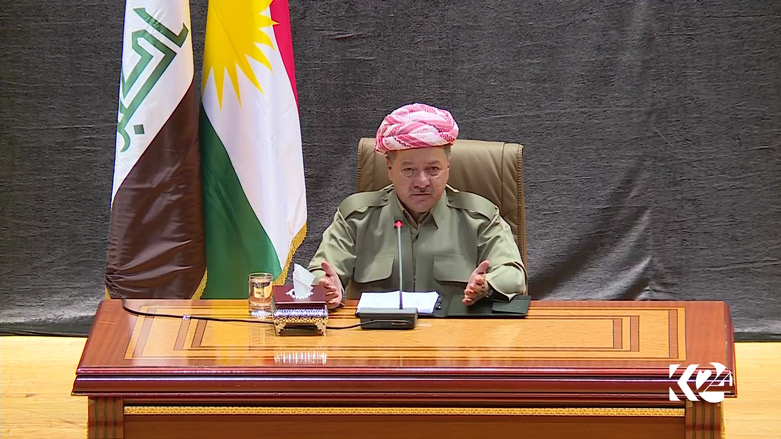What guarantees for Kurdistan people should referendum be postponed, Barzani asks

ERBIL, Kurdistan Region (Kurdistan 24) – In 2003, one of the highest ranking US officials involved in the region at the time stood against federalism in Iraq, recalled the top Kurdish official on Wednesday, and that the US had no choice but to "accept and deal" with the new reality.
President of the Kurdistan Region Masoud Barzani likened the situation then to the opposition the Kurdistan Region is currently facing, testifying to the fluidity of geopolitics in the Middle East.
Barzani met with more than a thousand of clerics in Erbil on Wednesday to discuss the referendum on Kurdish independence.
“The referendum does not belong to any one party in particular, but to all parties and people of Kurdistan [Region]… The referendum is not the objective, but a tool for independence,” Barzani said.
He reiterated that there is no real partnership with Iraq. He mentioned the state of the Iraqi army, saying Kurds previously made up 40 percent of the military, but now account for nearly none of its units, deeming Baghdad's treatment toward the Kurdistan Region “unacceptable.”
Barzani called on countries and local anti-referendum campaigns criticizing the timing of the referendum to explain their reasoning to the voters. “What guarantees for the future of the Kurdistan Region do you offer its people in return?”
Unlike Iraq, however, an independent Kurdistan would be a multiethnic, pluralistic and peaceful society, Barzani maintained. "We have a message of acceptance and brotherhood."
He insisted the referendum will be successful and paralleled the situation in Iraq circa 2003. “No one was as opposed to the establishment of a federal system for Iraq as US envoy Paul Bremer,” Iraq’s chief executive authority at the time.
“Once it became a reality, however, the US had no choice but to accept it,” Barzani said.
Addressing concerns regarding the possible closure of borders with the Kurdistan Region, Barzani gave strong assurances that he does not believe the borders will shut down.
He added that coexistence between Erbil and Baghdad has “failed” and will “continue to fail.”
“I told Baghdad to have the courage to say that the partnership has failed.”
In his speech, the Kurdish President mentioned that Baghdad was asking the KRG and Peshmerga to return to pre-2004 boundaries. “We must be united and stand together to prevent Baghdad from realizing its objective.”
He revealed that in the past years, Baghdad received international loans and did not share a single penny with the KRG. “When it comes to paying the loans back, however, Baghdad claims the KRG should pay its share,” Barzani noted.
The KRG has repeatedly warned Iraq that, should it continue to violate the Constitution and undermine the goodwill that went into the agreement, the Kurdistan Region would no longer want to be part of the country, Barzani stated.
Barzani laid out reasons why the post-2003 partnership between Erbil and Baghdad has “failed” on multiple levels: the lack of proper power-sharing, the violation of 55 articles in the Constitution of Iraq, and the marginalization of Sunnis and Kurds by the ruling parties.
The Kurdish President outlined the history of Iraq for the past 100 years, an Iraq which never considered the Kurdistan Region to be an equal partner, destroyed 4,500 villages, carried out genocidal campaigns against Kurds, and tried to change the demographics of entire areas in the Kurdistan Region by implementing multiple phases of Arabization.
Editing by G.H. Renaud
